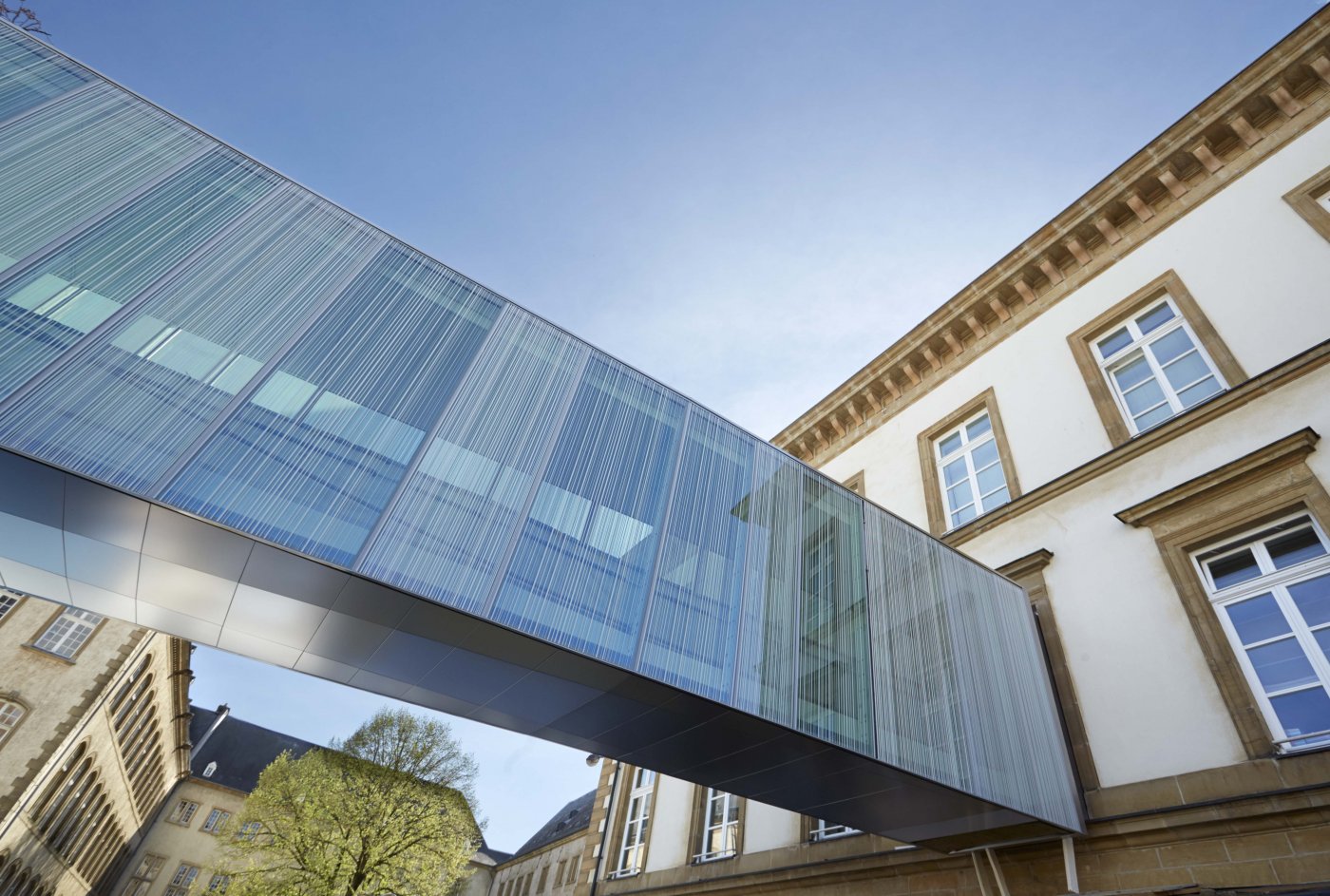Summary record
Video
Progress of the tram works and the future of the Gare district
Question posed by Gabriel Boisante
The section of the tramway between the city centre and Luxembourg Central Station was inaugurated on 13 December 2020. After the ribbon was cut, the works slowed down. We must not neglect the areas around the tram line, and especially the residents and merchants in the Gare district, who have to bear the double burden of the tram works and the Covid-19 pandemic. Many businesses in the district could be forced to close in 2021. Many business owners are disappointed with the lack of adequate financial support, and especially the lack of dialogue with Luxtram and lack of flexibility displayed by the personnel working on the tram project. Local residents are exasperated with the fact the fencing along the pavements still has not been taken down. Access is still difficult for pedestrians – especially young families and people with reduced mobility – and there is still no permanent lighting. When are the works on this section of the tram project scheduled to be completed? How long will it take to make up for the delays? What arrangements has the City made to enable Luxtram to complete the works before the summer and to give those living and working in this beautiful district a glimmer of hope?
RESPONSE PROVIDED BY THE MAYOR, LYDIE POLFER
The works being carried out by Luxtram are progressing at a steady pace. There are no delays. In fact, the works are even running four months ahead of schedule and are expected to be completed by 23 June 2021. The City has been exerting pressure on Luxtram on this matter. The first set of trees were planted this morning in Place de Paris in the presence of Minister François Bausch and City representatives. By the end of this week, all of the trees will have been planted. The additional budget allocation to transform Place de Paris into one of the most beautiful squares in the city – with fountains and a beautifully finished surface covering, among other things – is €3.5 million. The new cycle path alongside the tram line between Place de Metz and Place de Paris will be inaugurated on 2 April.
Completion and inauguration of the new football and rugby stadium
Question posed by Claudie Reyland
According to a report in the media on 22 February, further to a tour of the Stade de Luxembourg by UEFA representatives on 11 and 12 February 2021, it was found that the works had not progressed sufficiently for a mandatory test match to be played in real-world conditions. Consequently, the Stade de Luxembourg will not be able to host its first official match on 30 March 2021. Apparently, the delays are mainly due to setbacks in the commissioning of the ICT network, which is indispensable for the effective operation of the facility and for the performance of a series of activities (CCTV, computerised access control, WiFi, television broadcasting, fire detection, etc.). It appears that budget overruns in 2019 were due to poor management on the part of the supervising office.
Has the College of Aldermen taken any additional steps to ensure the timely progress and proper management of the works? Is the College of Aldermen aware that the results of preliminary tests on the ICT network were not satisfactory to all stakeholders? When were the preliminary tests on the ICT network carried out? Why were the municipal council and the relevant advisory committee not informed of the problem? When will new tests be carried out? Is the Covid pandemic the only reason for the unsatisfactory results of the preliminary tests? Were errors in oversight and/or in organising the installation of the ICT network committed by the supervising office? When will the first test match in real-world conditions take place? When will the new stadium be inaugurated?
RESPONSE PROVIDED BY THE MAYOR, LYDIE POLFER
The College of Aldermen issued a press release on this topic in early January 2021. An inaugural match between Luxembourg and Portugal at the new stadium was planned for 30 March 2021. At the beginning of January, the College of Aldermen announced that it would decide on 22 February whether the inauguration could go ahead as planned. The tour by the UEFA representatives changed nothing as far as those plans are concerned. The UEFA representatives said that the stadium was magnificent and that we should take as much time as we needed to ensure that everything was working perfectly. On 22 February, the College of Aldermen decided that the inauguration could not be held on 30 March. At the moment, it is impossible to say when the first test match will take place and when the stadium may be inaugurated. The College of Aldermen had hoped that the inauguration of the stadium would be a festive event, with a lot of spectators and especially a lot of young people, but unfortunately that is impossible for the time being on account of the pandemic.
The next international football match is scheduled to take place on 6 June. If the inauguration were to be held on that date – which is far from certain – the test match would have to be played three weeks before – i.e. around 15 May – in real-world conditions, that is to say, with everything up and running as if there were 10,000 spectators in the stadium, and with all the safety measures (police, CCTV, private security firms, etc.) in place and operational.
Right from the outset, the City had tasked a coordinator – the Paul Wurth firm – to ensure that the various stakeholders worked in a coordinated manner. The "Planungsgemeinschaft Nationalstadium Luxemburg" – which won the competition for the stadium project in 2014 – and the Luxembourg architecture firm are jointly responsible for any errors or omissions that may arise. The City will ensure that they assume their responsibilities.
Work on the ICT network – laying of conduits and fibre-optic cables, and necessary connections – has not yet been completed. The delays are due, in part, to the pandemic, and the company that was supposed to carry out the works in question went bankrupt during the pandemic. Another company was commissioned to complete the works. That company has undertaken to complete the works as soon as possible. The City hopes that the network will be operational before the end of March, and that checks on all related sub-systems – e.g. the fire alarm system, the lawn sprinkler system, heating, cash registers, turnstiles and the many CCTV cameras requested by the Grand-Ducal Police – could then begin.
Use of chemical fertilisers on municipal plots leased to farmers
Question posed by Linda Gaasch
On 18 November 2019, the municipal council approved the agreement on the leasing of undeveloped land to private individuals. The plots in question cover a total surface area of 26.84 hectares. At the end of the first three years, if the lease has not been terminated by the City or the tenant, it will be renewed for a further three years and will expire on 30 October 2028. An annex to the agreement was forwarded to me further to my question on the matter at a meeting of the relevant advisory committee. At the municipal council meeting on 18 November 2018, I asked what conditions needed to be satisfied to lease land under the agreement. The meeting of the environment committee that was announced has not yet taken place.
How many fields has the City leased to farmers, and how many tenants are there? Where are the fields in question located, and how are they used? Does the City regularly check whether farmers are honouring their commitments? Are there any fields where tenants, after having come to an arrangement with the City, are allowed to farm the land in a manner that is inconsistent with the agreed conditions because they farm another field in accordance with said conditions? Where are these fields, and under what conditions are such arrangements made? Does the City monitor these fields? What analyses has the City carried out in recent years? How often, and with what results? What steps can the City take if tenants fail to honour their commitments? Have such steps ever been taken? Under what circumstances? Is Annex 1, which sets forth the terms governing the management of the plots, the same as the annex to the 2010 version of the lease? If not, which items in that annex have been revised?
Question posed by Guy Foetz
Councillor Gaasch has just summarised the most important questions. I would just like to add that I have been approached by someone who believes that certain farmers are not honouring many of their commitments under the lease. I have just circulated to the members of the municipal council several documents related to the farming of corn on plot number 22. These documents are clear proof that synthetic nitrogen fertilisers had been used on that plot, which comes as no surprise since the corn stalks are 3 metres high, despite the poor weather conditions last summer.
Response provided by Laurent Mosar
The City of Luxembourg was one of the first municipal authorities to include a clause in all of its farming leases prohibiting the use of pesticides and chemical fertilisers. The clause provides for very strict conditions and requirements. The City's explicit consent is required to transfer the farming methods used on a plot of land leased by the City to another plot of land. Farmers must provide the City with their reasons for wanting to do so. No transfer applications have been filed to date. The City works with external experts to monitor how non-buildable land leased to private individuals and to companies is used. These experts advised the City against conducting chemical analyses of the land in question, since the results of such analyses are often difficult to interpret. Instead, they recommended that we carry out visual inspections. These inspections are carried out at important stages in crops' development and can discern whether or not plant protection products are being used. If a tenant is found to be violating the provisions of the farming lease, they will be contacted by the City and reminded of their obligations. Unfortunately, the visual inspections planned for spring 2020 had to be cancelled. The College of Aldermen is seeking an external partner to assist the City with the inspections. The search for an external partner will be extended to countries outside Luxembourg as no local providers have expressed interest. The inspections themselves will be carried out by a new "natural spaces manager", a recently created position in the Environmental Officer's team. The inspections are planned for 2021. The results could be presented to the relevant advisory committee at the end of 2021.
Marriage ceremonies
Question posed by François Benoy
According to the Civil Registrar's annual report, 498 civil marriages were performed in Luxembourg City in 2019. The figure has been on the rise since 2017, when 379 marriages were performed. Civil marriages are becoming increasingly popular. In Luxembourg City, marriages are performed on weekdays. Might it be conceivable to perform marriages on certain Saturdays as well, as is the case in other municipalities? The City of Esch-sur-Alzette streams marriages live (https://esch.tv/) and offers to record marriage ceremonies. These services are especially interesting given the multicultural make-up of Luxembourg City and the current pandemic. Would the College of Aldermen be open to considering such services? To allow more people to attend marriage ceremonies while observing the health protection measures in force, the law states that marriages can be performed in a municipal building other than the town hall. Why has the City of Luxembourg not yet taken steps to offer this alternative?
RESPONSE PROVIDED BY THE MAYOR, LYDIE POLFER
Successive Colleges of Aldermen have adopted the same position on this issue for decades, regardless of their political leanings. That position is to not perform marriages on Saturdays, mainly for organisational reasons, namely, the required presence of officials. To date, the City has not received a single request to livestream a marriage. Proposing such a service would raise issues in connection with the right of personal portrayal and the protection of personal data. Anyway, many marriages are filmed by those in attendance. A few years ago, the municipal council decided that the Bierger-Center was part of City Hall and that, in addition to the ceremony room at the City Hall, the reception room at the Bierger-Center could also be used to perform marriages. So far, this arrangement has proved sufficient to accommodate all those who wish to attend marriage ceremonies, observing the applicable health protection measures during the COVID-19 pandemic.
Tours of the City's museums for schools in the capital
Question posed by Claudie Reyland
Practically all the cultural institutions in the City closed on account of the pandemic. Museums remained open longer than theatres and concert halls. The Human Rights Commission (Commission consultative des droits de l'homme – CCDH) has emphasised that "access to culture for all is a human right". As such, and especially during the pandemic, it is important that we explore alternatives to in-person tours, theatrical performances and concerts. In an interview in the "Quotidien" on 18 January 2021, the Minister for Culture, Sam Tanson, had this to say: "It should be normal for young people to go to a museum, or to get up on a stage and express themselves freely. Once you've experienced that, no-one can ever take it away from you. It is essential".
How many museum visits have been organised by the City of Luxembourg's schools and childcare centres since the beginning of the COVID-19 pandemic (observing the health-protection measures in force)? Does the College of Aldermen believe it is important that the City's schoolchildren visit the museums? Have schoolchildren been educated about the importance of culture in life? Are they encouraged to visit the City's museums and its other cultural institutions, even outside school hours? These questions, apart from the first one, should be raised even when we are not in a time of crisis.
Response provided by Colette Mart
In times like these, cultural activities and the joy and intellectual stimulation they offer are sorely missed by many people. The Service Enseignement (Education Department) and the College of Aldermen place considerable emphasis on culture. Promoting culture among children is explicitly stated in the aldermen's mission statement. Two years ago, a civil servant was hired in the Service Enseignement for precisely that purpose after the Ministry of Education's (Ministère de l'Éducation nationale) decision to no longer allocate staff specifically to the City. The City maintains close contact with its museums, especially through their educational departments. So as not to overburden teachers with paperwork, the only trace kept by the Service Enseignement is the museums' annual bills. The City's two museums hosted 47 visits in 2019, and 19 in 2020. In 2019, there were 190 "natur musée" visits, and only 63 in 2020. The number of visits to the City's two museums rose again after the first lockdown, but the number of visits to the "natur musée" remained relatively low until June 2020. This was probably due to the highly proactive approach adopted by our two museums, which began offering teachers activities specifically geared towards school groups. The number of visits to the "natur musée" rose again in November 2020. There were 19 visits to the National Art and History Museum (Musée national d'histoire et d'art – MNHA) in 2020, but no visits to the MNHA's external sites (the Roman villa, the oppidum in Titelberg, and the Neolithic house). During the pandemic, the Service Enseignement undertook no activities to promote the outings, but the offering was maintained, with the constraints imposed by current circumstances. Educational material was sent to teachers, who also received virtual support from the Service Enseignement. The Service Enseignement is hopeful that it will be able to resume organising visits in the third term of the current school year.

















